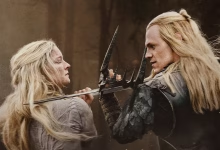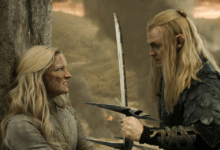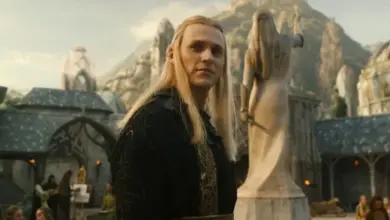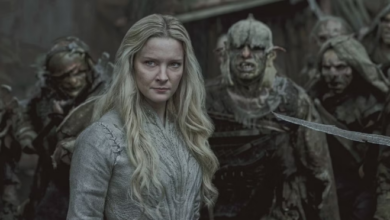Just How Powerful Are the Wizards in ‘The Rings of Power’?
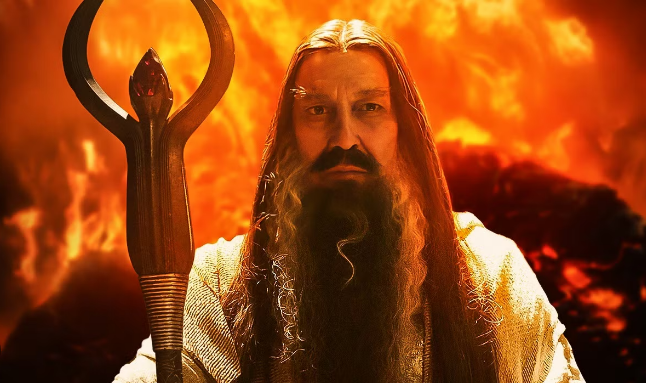
The Season 2 finale of The Lord of the Rings: The Rings of Power finally sees the Stranger (Daniel Weyman) earning his name as a wizard. To no one’s surprise, he is actually Gandalf, and the finale, “Shadow and Flame,” sets up a future confrontation with the Dark Wizard (Ciarán Hinds), who is an Istar, like Gandalf. We already know that Gandalf is powerful because, well, he’s Gandalf, but he is still a long way from unlocking his abilities to the fullest. Meanwhile, the Dark Wizard already seems to have great control over his own powers, and, since it seems like we are headed for a showdown between the two of them, it begs the question: just how powerful are they?
The Istari Are Maiar, Angelic Beings of Immense Power

So far, in The Rings of Power, much has been said about the Valar, the beings who manage and shape Middle-earth. They are often mentioned in Númenor, with Elendil (Lloyd Owen) and Míriel (Cynthia Addai-Robinson) leading the Faithful. Sauron (Charlie Vickers) also disguises himself as an emissary of the Valar to trick Celebrimbor (Charles Edwards) into forging the Rings of Power in Eregion. The Valar are Ainur, beings created by Eru Ilúvatar (who is the equivalent to God in J.R.R. Tolkien’s writings), and each of them represent a different aspect of existence. To aid the Valar in their tasks, Eru created the Maiar, who are lesser Ainur, but still immensely powerful.
The Maiar first come into being around the same time as the Valar, as Eru creates the Ainur to sing and help him in the creation of the world, known as Arda. Once Arda is created in the Ainundalë, or Song of the Ainur, the Maiar enter the world to help shape it under the guidance of the Valar. Though less mighty than the Valar, the Maiar possess great power and knowledge, each serving specific roles according to their alignment and purpose. None of the Ainur are inherently good or evil, but rather become so through their experiences. The same goes for the Maiar, who have their missions and tasks to fulfill, but determine their alignment throughout their existence.
In Middle-earth lore, the Istari are Maiar. They don’t necessarily have a specific Valar whom they serve, but often act under Manwë’s orders, who is the chief of the Valar. Before being sent to Middle-earth – which, in the books, happens only in the Third Age, not the Second – they lived in Valinor, and, as Ainur, their powers are beyond measure or comprehension to the Elves and Mortals. They are instructed to control their powers and only use them when absolutely necessary, but, when they do, it becomes clear that they belong to a whole different level in terms of power.
The Wizards Are Not the Only Maiar in ‘The Rings of Power’
Under the Valar’s guidance and orders, the Maiar perform an essential role in the shaping of Middle-earth. They are the Ainur, who are often sent to Middle-earth to aid and sort the affairs of the Children of Ilúvatar (Elves and Men), and other beings. This is because, when the Valar interfere directly in the fight against Morgoth in the First Age, the destruction and bloodshed is so great, that Eru has to sink the bigger part of Middle-earth to cleanse it. So, they only interfere when there is no other alternative, relying on the Maiar to carry out their will, instead. As a result, there are many Maiar living in Middle-earth, not just the Istari.
The most powerful of the Maiar in Middle-earth is, of course, Sauron himself. In Season 2, Sauron makes full use of his powers to manipulate the Free Peoples of Middle-earth for his own benefit, which includes shape-shifting, casting illusions, superhuman strength, and even controlling other beings’ movements – and this is just a fraction. He isn’t the only Maiar we see in Season 2, though. There are the two Istari in Rhûn, but there is another Maiar resting within the depths of Khazad-dûm, the Balrog. Like Sauron, the Balrogs are also Maiar, who were corrupted by Morgoth upon coming to Arda, and served Morgoth in his war against the Valar and the Free Peoples in the First Age. Somehow, one of the Balrogs made its way to Khazad-dûm.
The fight between Gandalf (Ian McKellen) and the Balrog Durin’s Bane in The Lord of the Rings: The Fellowship of the Ring is the best example of the sheer scale of the Maiars’ powers. The Balrog’s sheer physical strength and its control over elements like fire and darkness contrast with Gandalf’s ability to wield magic and light through his never-ending strength of will. They both wield power on a scale which is simply no match for any of the other members of the Fellowship, and it’s impressive to see Gandalf go beyond the abilities he usually shows them. This is the level of destruction that threatens Middle-earth under Sauron and whoever aligns with him.
‘The Rings of Power’ Is Setting up a Deadly Confrontation Between the Wizards
Fighting an Istar is no easy task even for another Maiar, so it’s a good thing that Gandalf doesn’t engage the Dark Wizard in a direct fight in the Season 2 finale. He is far from achieving the potential he has in The Fellowship of the Ring, and that would surely result in his defeat. However, the altercation between the two wizards does set up a future confrontation between them, and it promises to be a defining moment for Gandalf in The Rings of Power. The sheer power involved in a confrontation between two Istari is destructive in itself, and we also see that in The Fellowship of the Ring, when Saruman and Gandalf fight after the White Wizard aligns with Sauron. Right now, the power difference between the Dark Wizard (whoever he is) and Gandalf is even bigger, so that promises to be a huge challenge for our favorite wizard.
